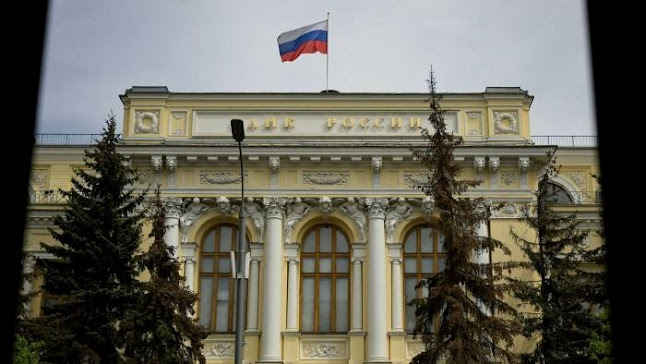The dollar sits atop a global monetary order shaken by sanctions
Countries tend to hold certain currencies as reserve assets mostly for economic, not geopolitical, reasons
Isabelle Mateos y Lago
 The Central Bank of Russia headquarters in downtown Moscow. The G7 and its allies in Europe and Asia have declared a freeze on its assets © Natalia Kolesnikova/AFP/Getty Images
The Central Bank of Russia headquarters in downtown Moscow. The G7 and its allies in Europe and Asia have declared a freeze on its assets © Natalia Kolesnikova/AFP/Getty ImagesDays after Russian troops invaded Ukraine, the G7 and a host of allies in Europe and Asia declared a freeze on the assets of the Central Bank of Russia.
The move, unprecedented in its swiftness and scale, instantly incapacitated roughly half of its $630bn in international reserves.
Up to this point, central bank reserves had only been frozen multilaterally after abrupt regime change — think of the Bolshevik and Chinese revolutions, or more recently Hugo Chávez’s Venezuela.
Immediately, warnings were uttered about unintended consequences, in particular the stability of the US dollar in the international monetary system.
As many have convincingly argued, the Russian reserves freeze alone is unlikely to end the dominant role of the US dollar.
But it might, over time, induce major shifts in global monetary relations alongside a broader rewiring of globalisation, making the last 30 years look like a lost golden age.
Prudence and deliberation are in central banks’ DNA.
They do not make rash decisions.
So while many central bankers privately felt shock or dismay at the reserves freeze, they do not appear to have significantly reallocated assets away from the dollar or euro.
Yet there is consensus among central bank reserve managers that something fundamental has changed: geopolitical considerations now need to be taken into account when assessing the safety and liquidity of a reserve asset.
For most, this is an argument in favour of currency diversification, a trend under way already over the past 20 years at the expense of the US dollar and to the benefit of smaller advanced economy currencies such as the Canadian dollar or the Korean won.
This might now accelerate, and possibly extend to additional currencies.
Might the renminbi be one of the beneficiaries, as suggested by a recent survey?
In fact, when it comes to the attractiveness of Chinese bonds in reserve portfolios after the sanctions on Russia, geopolitics is a clear dividing line.
By and large, central bankers I talk to in countries in or close to the sanctioning coalition are reviewing — but not yet retreating from — whatever exposure or planned exposure they had to the renminbi.
Others seem more inclined to stick to their holdings and plans to ramp them up further over time.
But ultimately, international reserves are held for specific economic reasons, not geopolitical ones: pegging or managing the exchange rate to another currency; paying for imports and international debt service; providing foreign exchange liquidity of last resort to domestic banks.
So what will determine the extent of any shift in global reserve allocations is not the portfolio preferences of central bankers or the intrinsic properties of US dollar alternatives.
It is whether new currencies come to play an important role in international trade and financial relations.
The recent news of China negotiating with Saudi Arabia to pay for oil in renminbi is not, in itself, game-changing.
If it finally happens and more of China’s inbound and outbound trade partners follow, it might well be.
In the near term there is little practical scope to overhaul trade and financing patterns, even if some countries want to.
But other forms of rewiring may develop.
Countries that see themselves as politically aligned may try to create a mutual aid system, separate from the sanctioning coalition.
China’s recent creation of a renminbi liquidity facility at the Bank for International Settlements can be seen in this light.
Discussions could also resurface between large reserve holders from the global south about swap arrangements, like those between the Fed, European Central Bank, Bank of England and a few others in the 2008 financial crisis.
Cross-border payment systems to rival Swift will probably continue to grow.
There may also be a temptation to resort to much less transparent custody arrangements for reserve assets and much less transparency in their currency composition.
It was a remarkable achievement of the past 10 years that the share of global reserves reported to the IMF’s currency composition database went from 55 to 93 per cent.
This could now well go into reverse.
Those who fear that such a wholesale rewiring of globalisation would do more harm than good to global prosperity have called for new rules of the road.
This seems well worth a try, but with eyes wide open to the risks of triggering another round of adverse consequences.
Article 16 of the League of Nations covenant, which codified the use of economic sanctions after the first world war, not only failed to prevent the world from dividing itself into rival blocks but may even have accelerated the rift.
The writer is global head of the official institutions group at BlackRock and a former IMF official
0 comments:
Publicar un comentario